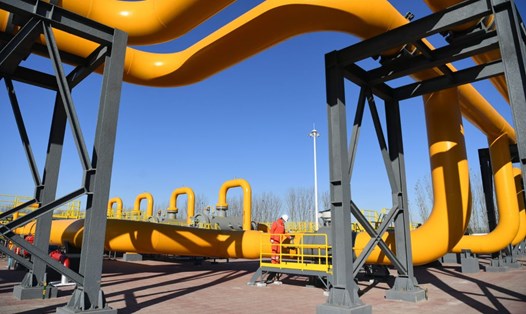Hiding deep underground in the Appalachian region for more than 400 million years, the Marcellus ice quarry holds a huge energy treasure trove of an estimated 7.42 trillion cubic meters of gas, enough to provide energy for the United States for hundreds of years.
But to exploit this resource, the US must face a difficult problem: Will this be an economic lever to create hundreds of thousands of jobs, or a risky environmental bet with water pollution and earthquake risk?
Stretching more than 246,000 km2, the Marcellus ice mine spans through Pennsylvania, New York, Ohio, West Virginia, Maryland, Virginia, Kentucky, Tennessee and is one of the world's largest natural gas mines. Thanks to fracking technology, this resource can become easier to exploit than ever.
According to the US Energy Information Administration (EIA), the total reserves that can be exploited from the Marcellus dredge will help the US reduce gas prices, reduce dependence on imported oil and gas and strengthen its position as an energy powerhouse. However, this huge opportunity comes with a series of environmental and policy challenges.
If fully exploited, the Marcellus marble quarry could create 280,000 jobs, bringing hundreds of billions of USD to the economy. Each new well can contribute an average of 4 million USD to local economic growth.
States such as Pennsylvania and West Virginia have taken a heavy stake in pebbles, while New York has completely banned fracking due to concerns about groundwater pollution and long-term environmental consequences. Currently, oil and gas companies are looking to improve technology with solutions such as limiting water use, more environmentally friendly chemicals, and advanced waste treatment systems to minimize negative impacts.
Fracking - the main technology for the exploitation of da - has been met with criticism for causing water pollution, methane leakage, artificial earthquakes and reduced air quality. Some areas in the US have recorded high levels of toxic gas and contaminated water sources with chemicals, causing public concern about the real price of this energy revolution.
In addition, fracking earthquakes are becoming an increasingly serious problem. Studies show that pumping high-pressure water into the ground to separate the rock layer can cause small but frequent earthquakes, especially in areas with weak geological foundations.
According to the Daily Galaxy, the Marcellus ice mine could help the US gain energy independence, reducing dependence on the Middle East and Russia. However, if exploitation is not controlled, it can leave unpredictable environmental consequences.
The federal government and states are seeking to balance economic benefits and environmental protection responsibilities with strict regulations on wastewater treatment, air pollution monitoring and exploitation limits in sensitive areas.







